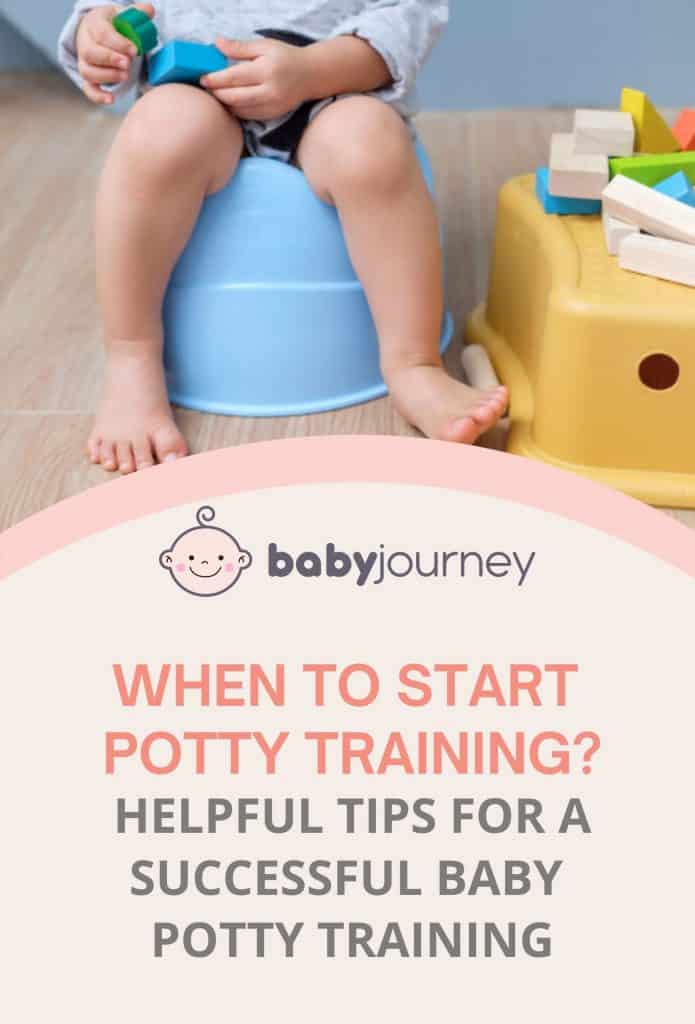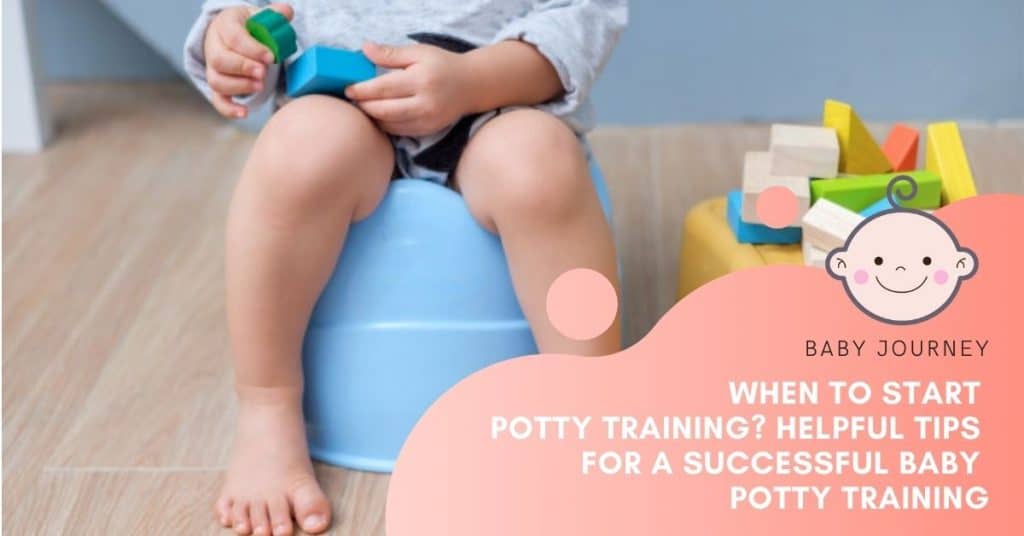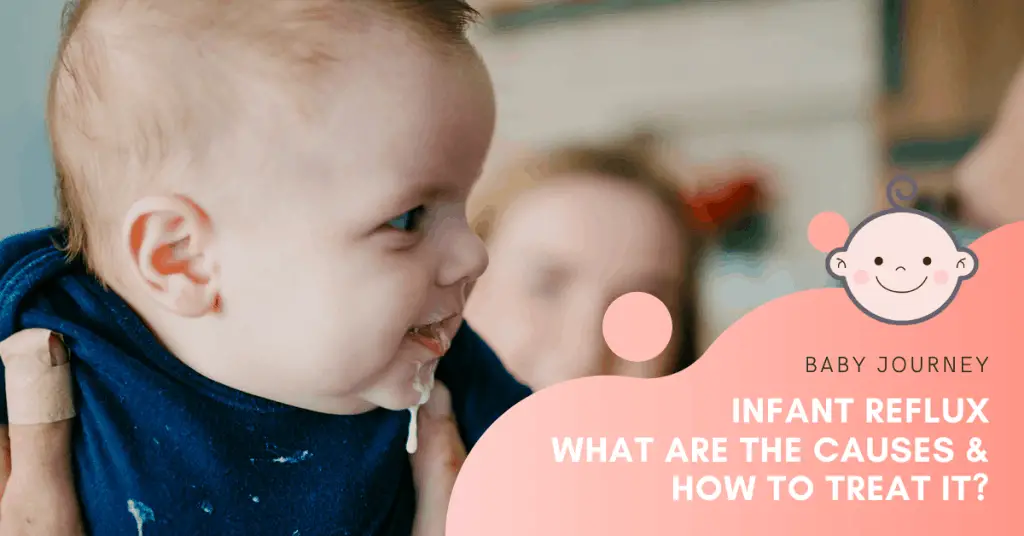Parents wonder when to start potty training and listen to the recommendations and other parent’s experiences. But, the key is to listen to your child’s needs.
There isn’t a textbook best time to potty train, the children are unique, and so are their needs. I started my daughter’s potty training before her second birthday, and it included a lot of patience!
Today, I’ll be sharing everything you need to know about potty training, including the answer to the most commonly asked question: When to potty train?
When Should You Start Potty Training Your Child?
According to Mayo Clinic, most children get ready for potty training between 18 months and 24 months. Signs to start potty training aren’t recognizable in some children until they are three, the Clinic also states. Therefore, you shouldn’t rush the child. Instead, pay attention to the change of some baby’s pooping faces and habits and be patient.
Parents.com shares that baby girl potty training usually starts a few months earlier than the boys of the same age. Nevertheless, when should boys be potty trained depends on the boy itself and not on gender and age.
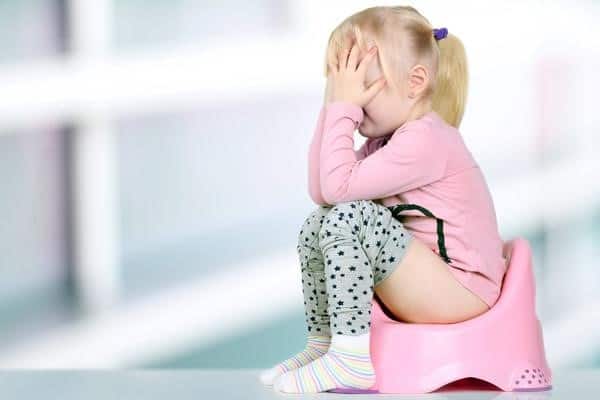
Is early or late training bad?
It is easy to feel pressured to teach the baby to use the potty as soon as possible. However, pushing the baby too early or too late to get toilet habits can lead to physical problems, and wetting accidents.
To avoid anxiety about ideal potty training time, focus less on the age and more on the signs your toddler is ready to potty train.
Signs of Potty Training Readiness
If you are still unsure about “is my child ready for potty training?”, look for the following signs to determine if the child will respond to the training.
Your child gives you fewer dirty diapers
If you are changing diapers less frequently than before, or your baby is waking up with a dry diaper, he or she is slowly getting control of their urges. One study even confirmed the connection between teaching baby toilet manners and the ability to keep their diapers dry.
Your child dislikes dirty diapers
During the diaper change, some children get nervous or try to stay away from the dirty diaper. If your baby tried to touch it before, and suddenly refuses and crawls away from the diaper, it is a good sign that your child slowly becomes ready for potty training.
Your child is interested in staying dry
When a baby shows signs of discomfort when having wet diapers, it is safe to conclude that he or she associates dry diapers with pleasant sensations. You may notice that the baby gets irritated and nervous whenever a diaper is wet.
Your child can independently undress and do things on their own
One of the essential potty training signs is the child’s ability to undress by itself. Most children learn it easily. To help your child develop motor skills for undressing, let him or her wear clothes that are easy to take off.
Your child tells you he/she is going to dirty the diaper
It is challenging to teach the child to use a baby potty chair if your child doesn’t know what he or she is doing. Look for the signs that the baby understands that something is happening.
If your child hides to poop or pee, or shows a diaper, or doesn’t want to do it in the full room of people, you can slowly start with the potty training.
Your child is already walking and running well
The urge to pee or poop happens suddenly in toddlers, so it is important to start the training when the baby walks and runs comfortably. That way, you will avoid accidents and the baby won’t associate falls or bumps with the toilet needs.
Your child can sit still
If the baby cannot focus on one activity for more than a few seconds, he or she won’t comfortably sit on the potty chair long enough to use the toilet.
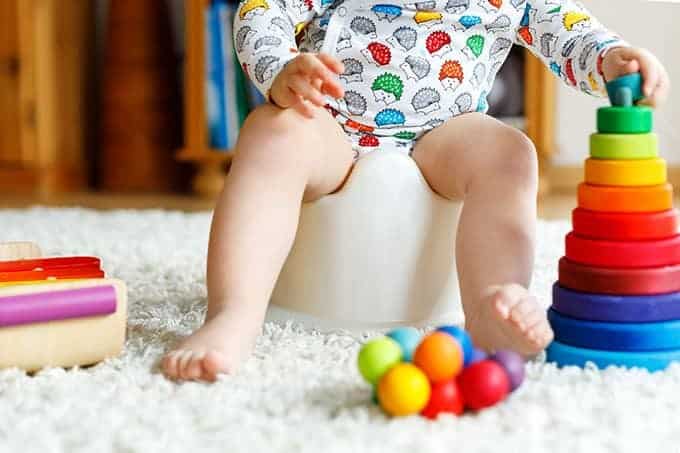
Potty Training Checklist
Get everything ready to make sure the training goes as smoothly and fun as possible. So, prepare the following:
✔️ Potty chair: Find the one that is comfortable and easy to clean and disinfect. The Regalo 2-in-1 potty chair is a cool potty that meets all the needs! Your child’s potty training session is made more fun with flushing sounds just like a real toilet and has a comfortable toilet seat perfect for toilet training.
✔️ Disposable training pants: These have the same properties as diapers but are easy to pull up and down by children. They also prepare the baby to wear underwear once they are potty trained.
✔️ Comfortable Clothes: As mentioned, undressing is an important step in potty training. Get a few trousers or shorts that your child can easily take off and on.
✔️ Good amount of Patience: Potty training can take time, as it happens only at children’s pace, not parent’s. Remember, what age to start potty training and the duration of it are 100% individual.
How to Start Potty Training
A few steps prove effective when training your child to determine the time to potty and proper use.
Take two days at home
For the first two days of potty training, don’t go outside, you can try keeping the baby in the underwear or training pants all the time.
Offer the toilet frequently
Because you don’t know when the baby is ready to use the toilet, you can start by offering potty frequently. You will probably get the timing right eventually, so the baby will slowly associate potty with the urge to pee or poop.
Ask about dry training pants or underwear in between
Between two offerings, ask the baby if the training pants are still dry, to help him acknowledge the dryness. Always praise the baby for dryness.
Praise for potty use
Just like teaching toddlers not to simply scream or teaching your children to pick up a skill like swimming, positive reinforcement is effective. Hence, whenever you get the timing right about potty time, and the child pee or poop in the pot praise it.
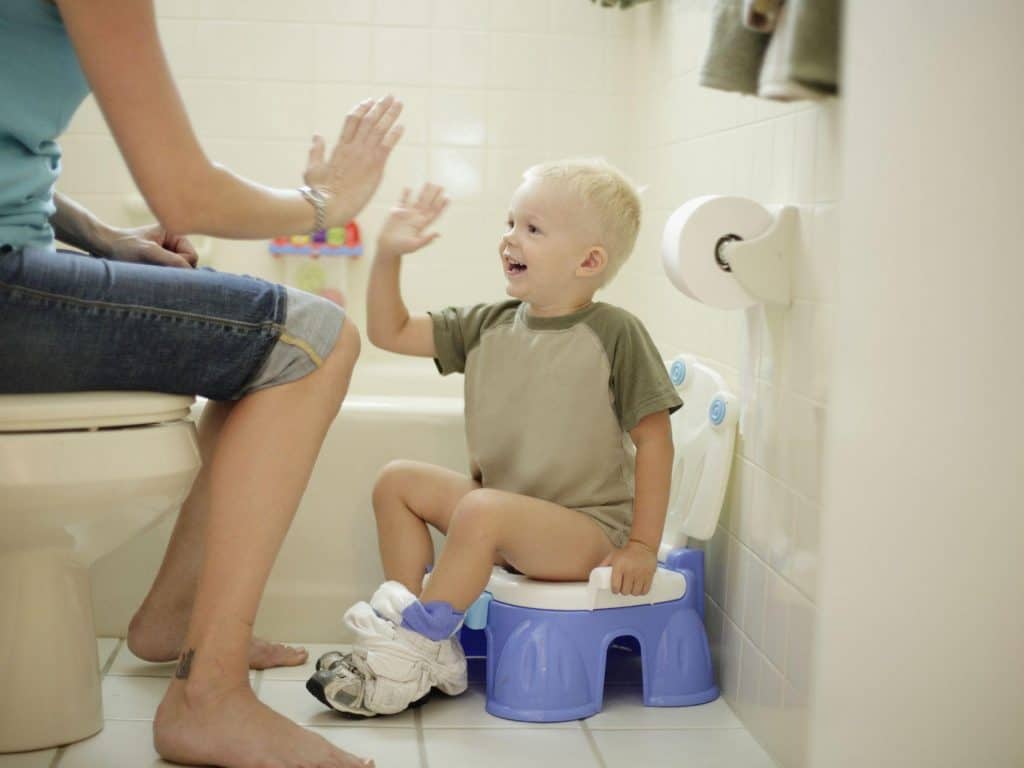
Be nice with the accidents
Whenever the accident happens, be kind to the child but repeat that we pee or poop in the potty. Be patient, accidents happen at the beginning of the potty training, so you have to be consistent. You can try saying Oh-oh every time after the accident or use words such as No-No.
Slowly introduce the nighttime routine
If you are starting potty training earlier than two years, wait a bit with the nighttime routine. Let the baby understand potty use and gain more control of his or her urges before you ditch diapers during the night.
Once you sense that potty training goes well and the baby communicates about its urges, slowly replace diapers in the night with underwear.
Be smart with nighttime
Once the baby is partially adjusted to potty, introduce nighttime training. Ask the baby to go on the potty just before bed.
Even if the baby doesn’t have to go, ask him or her to try. Explain to the baby peeing during the night does not differ from daytime – the child needs to communicate that he or she wants to go, get out from the bed, and go to the bathroom.
Potty training child with developmental delay is most effective when you take one step at a time, so the child has time to adopt good habits. The steps don’t differ from the ones I previously described, but praise more and focus more on keeping the child motivated than completing the training soon.
When Not to Push Potty Training
Consistency is the key, but there are some situations in which it is okay to pause with potty training. The most common reason to delay a potty training is when you started too early and the results aren’t satisfying.
Here are other situations in which you can delay potty training:
- When a child has health problems
- On family trips
- During big changes – moving to a new place, getting a sibling, stop using the crib and so on
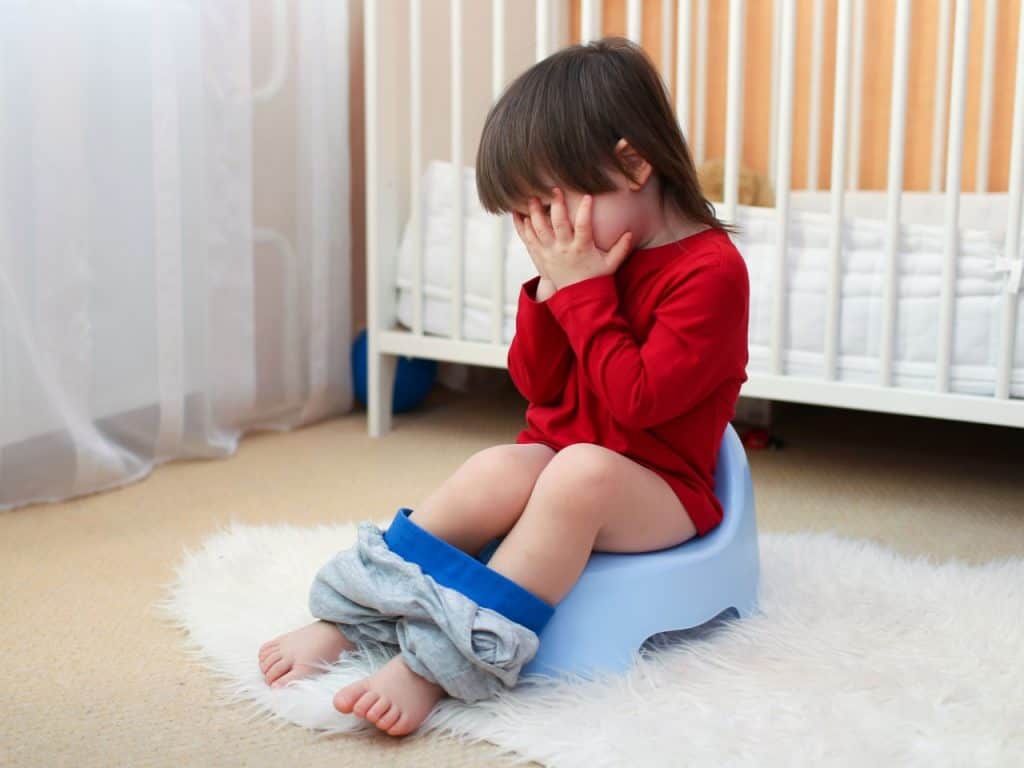
Tips for A Successful Potty Training
How to get a toddler to tell you when they need to potty? Try the following tips
- Let the baby choose the potty: Narrow the choice down to the few suitable potties and let the child choose. It will prevent the baby from developing resistance to potty when the training starts.
- Work on a schedule: Develop a potty routine – after the baby wakes up, after breakfast, a few times in the day, before bed, etc. The baby might get the habit of using the potty before or after certain activities.
- Praise for success: Every time your toddler pee or poop in the potty or go through the night with a dry diaper, introduce hugs and kisses as rewards! You can applaud and tell him bravo!
- Try naked potty training: Take one hot day and let the baby be naked as long as possible.
- Show the example: Next time you have to go to the toilet, bring your child with you and explain how simple to use the toilet is.
- Never punish accidents: Potty training is a learning process and if the accidents happen, explain to the baby that it is okay and that he or she can try it later. Punishing the baby for accidents may cause the baby to associate the potty with punishment.
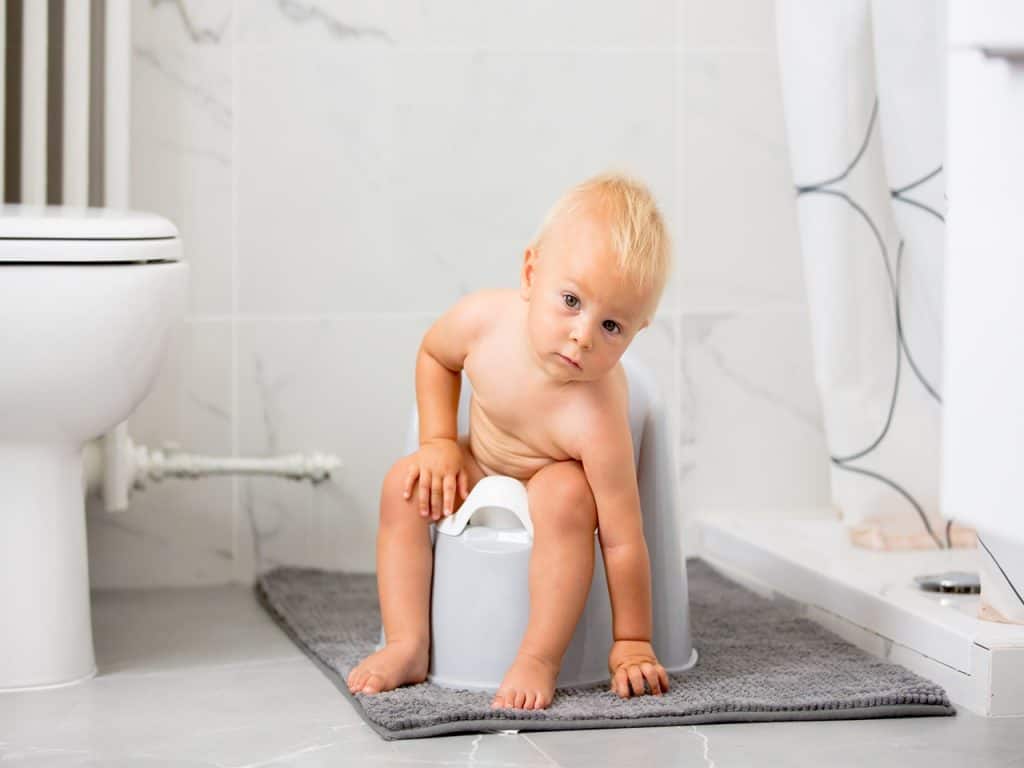
When to Start Potty Training: FAQs
Most parents have the following questions related to potty training!
Is age 3 too late to potty train?
No, how early can you potty train and how long to wait, depends on the child. If a child doesn’t show signs that he or she is ready until their third birthday, don’t worry, it isn’t too late. At that age, toddlers are easier to train in most cases.
What happens if you don’t potty train?
Lack of potty training can confuse the child about urges. It can lead to constipation, wetting accidents, and bedwetting.
Why is potty training so hard?
The challenges with potty training occur from the start and many parents have questions: how to know when to start potty training, what is the right approach, it is okay to pause, is it too late, etc. The difficulty is the lack of individual guidelines, so most parents rely on universal tips, which might not work with every child.
When is a child considered potty trained?
Your child is potty trained when he or she understands his urges to pee and poop and can do it without the little help of parents – wiping after the toilet use.
How long should a toddler sit on the toilet when potty training?
Let your little one sit for no longer than three to five minutes, because prolonged sitting can feel like punishment.
Conclusion
When to start potty training is usually when your toddler turns 18 months old onwards. There is no perfect age to start potty training your kids as each child learns at different paces, so no matter what, always be on the lookout for agreeable signs that show your child is ready to be toilet trained. Never force your child.
Potty training might not be difficult as long as you listen to the child’s needs and are ready to try different things. What worked for my daughter, such as giving M&M after using the potty to pee, might not work for your children.
Also, don’t blame yourself or your child for wetting accidents, give your child time and support!
How is your child’s potty training going? Feel free to ask more questions in the comments!
—
